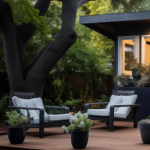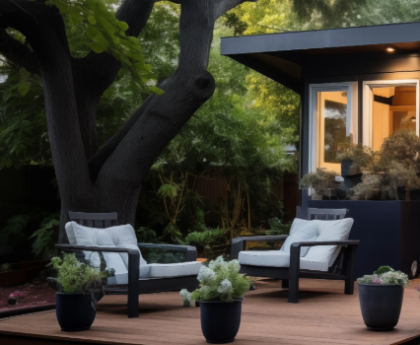OKLAHOMA CITY – In a public meeting Thursday, the Oklahoma City Planning Commission considered lifting a longstanding ban on backyard houses or “granny flats” in OKC, allowing homeowners to build, maintain, and offer small auxiliary units on their properties for the first time in decades.
Accessory Dwelling Units, or ADUs – which comprise any secondary living unit that includes cooking and sanitation accommodations on the same plot of land as a residential house – have been explicitly disallowed by city zoning regulations for years.
But as the housing crisis continues and the demand for small inner-city housing skyrockets, many are realizing the potential benefits of ADUs as a possible solution.


Tulsa voted to allow ADUs last year and Norman did the same in March of this year.
“There are a lot of benefits to allowing accessory dwelling,” Assistant Planning Director Lisa Chronister told Free Press by phone ahead of the Planning Commission meeting. “Everybody’s aware that we’re in a housing shortage, and have been for some time. But this can also provide a homeowner with supplemental income that could make their main house more affordable. So we think there are a lot of social benefits.”
Following debate and citizen comments, the Planning Commission voted Thursday to allow the new ADU-inclusive proposal to go up for a final commission vote on Thursday, June 13th.
If that vote passes, the proposal will then go before the City Council.
Housing demand and desire
The most pressing reason for allowing ADUs into the city’s residential zoning plans is the clear need for more affordable housing units, particularly around the city’s core.
The initial ADU proposal being considered would apply only to the city’s “urban core” in neighborhoods from NW 63rd Street to SW 59th Street between I-35 and I-44.
Proponents of the proposal say these are currently the most desirable areas for affordable housing development as prospective renters increasingly value walkability and city access above all else.


“When I sit down with a new prospective buyer and hear what they’re looking for, in the last fifteen years what has dramatically changed is a desire to live near a walkable district,” said Gary Caplinger, Associate Broker for OKC real estate firm Verbode, in a statement before the Planning Commission.
“Every conversation I have is someone that wants to be able to bike or walk to one of the entertainment districts. That’s been the preeminent thing,” Caplinger said at the meeting. “And the second is a property with a second unit. That’s coming up again and again.”
Chronister echoed this when speaking to Free Press, stating that focus groups and studies from the Planning Department showed that homebuyers and owners are increasingly wanting second units that can be turned into rentals or separated living spaces for family members.
“The supplemental income from renting can actually help more people own a home,” she said. “But another benefit we’ve heard from a lot of people is that they want a place where maybe their disabled adult sibling can live on the property, or if they have an aging parent that still wants some independence. There’s a lot of benefit in them being in shouting distance from one another.”
Renovation needs
The garage apartment is one type of Accessory Dwelling Unit that remains common in neighborhoods throughout the city. This popular inner-city rental type saw numerous examples grandfathered into allowance when current zoning regulations went into effect decades ago.
Though these existing ADUs have continued to be allowed and rented without repercussions, Chronister explained that any significant renovations or updates to them have been rendered nearly impossible for years because of the current regulations.
“Another reason we want to explicitly allow for accessory dwellings is because some our older existing ones can’t get any kind of building permit or inspection because they’re technically not allowed,” she said. “So we’ve written this new proposal with an eye toward allowing a path for these older ADUs to get renovated and to come into compliance with current codes.”
Historical concerns
Many of those garage apartments and existing ADUs that were allowed and grandfathered in years ago remain within OKC’s many historical neighborhoods.
Some residents and property owners in those neighborhoods worry that constructing new ADUs could damage or compromise their historical status.
Marva Ellard, Board President of Historical Preservation, Inc., representing the neighborhood association of Historic Preservation (HP) District Heritage Hills, was the only citizen speaker to voice concern or pushback of the proposal to the Planning Commission on Thursday.


“One of our biggest issues is that we have kept in touch with the Planning Department over the past year and half, and we were told that HP and HL [Historical Landmark] districts were not included in the first phase of this plan,” Ellard told the commission. “And we realized last Friday that HP and HL districts are included.”
Ellard said that she and the groups she represents are not opposed to allowing ADUs in the city, but that she believed further debate and input was needed before approving the final vote on this proposal.
“There are thousands of people in HL neighborhoods and I don’t think that we were included,” she told the commission. “We would like the time to work with staff and whomever to discuss these issues, see where our differences are, see what we have in common, and see what we could work out for an ordinance that could serve all parts of the neighborhood.”
Short-term rentals
Ellard also voiced concerns that any ADU built at current construction costs would likely be so expensive as to result in prohibitively priced units unaffordable for the majority of low-income renters most affected by the housing crisis.
“So a lot of people who are interested in this are people that have short-term rentals,” she said. “We’re seeing a lot of it in Paseo especially where people are buying these cute little bungalows and turning them into Airbnbs because the return on their money is much higher.”


by Nicolás Boullosa, https://flickr.com/people/faircompanies/
Chronister expressed to Free Press that the potential for more short-term rentals continuing to edge out low-income rental properties was another concern seen in Planning Department focus groups.
“So we don’t have any protection from that,” Ellard told the commission. “I don’t know how we get protection from that, but we don’t have that protection.”
Debate and vote
These concerns, in particular the questions of HP and HL districts, led to an open debate between Planning Commission members, with Ward 2 Commissioner Janis Powers advocating for delaying any vote until after further consideration.
Ward 2 includes several HP and HL districts, including Edgemere, Crown Heights, and the Paseo.
Camal Pennington, Ward 7 Commissioner and Planning Commission Chair, said that he understood the concerns, but that the need for more housing options makes the proposal a priority.
“I’m strongly in support of there being ADUs, I’m very strongly in support of it,” he said from the horseshoe. “I know that there is a housing crisis and I think we all are there. I think the question is how we can find a way to pass an ordinance that works for everyone.”
The Planning Commission voted 8-1 in favor of setting a final vote to approve the proposal on June 13th. Only Powers voted against it.
Author Profile





